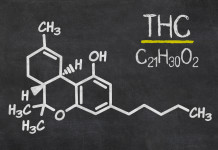Once you smoke marijuana the compounds are carried through the bloodstream where it finds its way to the rest of the body. The main active ingredient in marijuana being THC, it is a highly potent compound in relation to other psychoactive drugs. From the moment that the THC is travelling in your bloodstream, THC will typically get to the brain a few seconds after it has been smoked and releases its effects.
Marijuana consumers will most often define the marijuana experience of inhaling the drug as relaxing to begin with and then moves to being mellow, while bringing about a hazy feeling with light headedness. Of course these feelings will differ from individual to individual and also depending on the strain of marijuana consumed.
Once this experience starts the user’s eyes will begin to dilate and may result in certain colors appearing more intense than usual, while other body senses may become quite enhanced. As time progresses the consumer may start feeling paranoid and panicky. This interaction between the user’s brain and THC is what brings about these experiences. You need to understand how these experiences are triggered from the brain and which specific parts in the brain are affected to fully comprehend the whole process.
Information processors found in the brain are called neurons and are basically the cells that transmit information from the brain to other parts of the body. But what allows the neurons to transmit these messages: neurotransmitters. These are the chemicals that enable the process of communication to take place from one neuron to the next. These chemicals, neurotransmitters, are the ones that fill the gap between two neurons. They also bind themselves to protein receptors that make it possible for different body functions in the body and brain to be switched on and off.
There are neurons that have thousands of receptors that only work with certain specific neurotransmitters. When foreign compounds such as THC try to block or copy the behavior of neurotransmitters it interrupts the normal function of these neurotransmitters.
The human brain is made up of different groups of receptors of cannabinoids that are concentrated in different parts of the brain. These receptors have influence on the following brain functions: learning, coordination, short term memory, and problem solving. Any high concentration of these receptors is found in the cerebellum, hippocampus and basal ganglia. The hippocampus is found inside the temporal lobe and its main function is main short term memory capacity.
When THC binds itself to cannabinoid receptors within the hippocampus it interrupts the short term memory function. A marijuana consumer may therefore not be able to recollect events of the recent past. When THC binds itself to these receptors it will also affect the brain’s coordination function which is controlled by the cerebellum. Motor coordination may also be affected or impaired as a result of marijuana influence. This could be caused when the basal ganglia’s functions which is coordinating muscle movement is affected as a result of marijuana consumption.
































